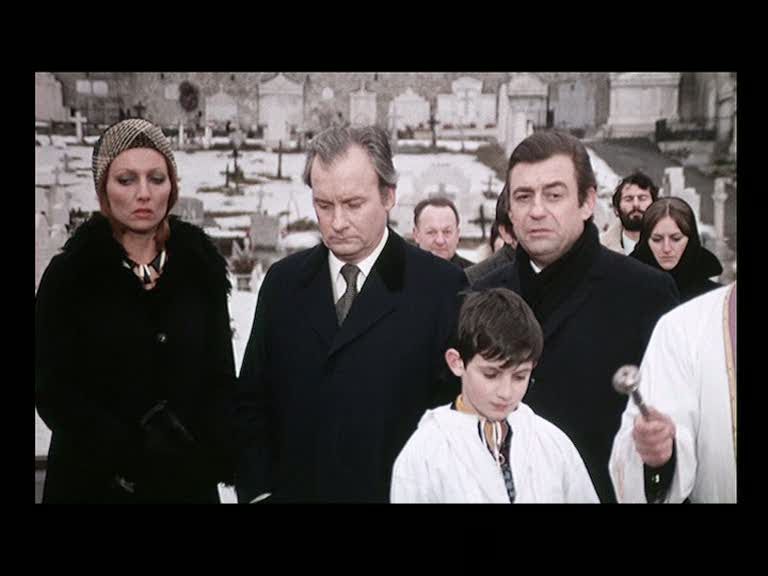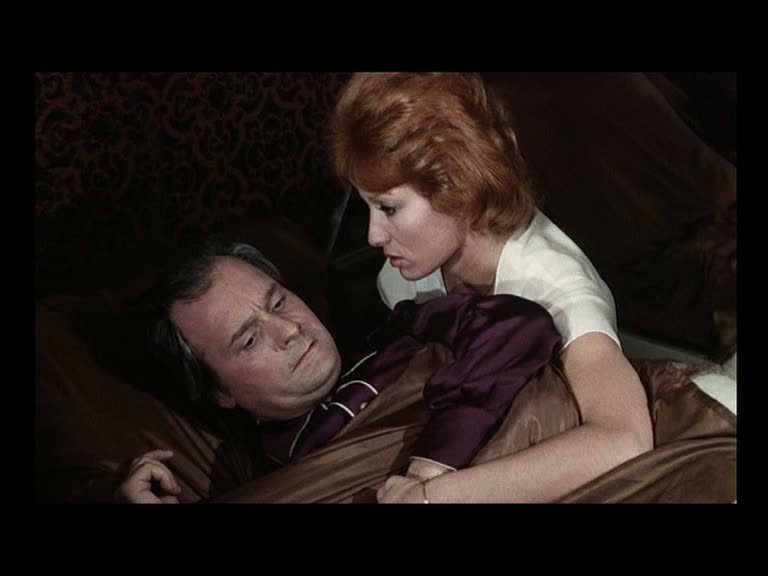
[This is a contribution to the Claude Chabrol Blog-a-Thon currently running at Flickhead from June 21 to June 30. For ten days, Flickhead will be dedicated to the works of the French New Wave master, and I'll be following along with many reviews of my own.]
Claude Chabrol's Juste avant la nuit is a suffocating psychological study of a man who is overwhelmed by guilt, and who, more than that, is devastated by the discovery that what he had thought to be a stable system of justice and morality was actually a paper-thin veneer, easily destroyed. In the opening scenes of the film, the respectable businessman and family man Charles Masson (Michel Bouquet) accidentally kills his lover during a sadomasochistic game of playacting that goes too far; he strangles her and leaves her corpse behind. It is a horrible crime, but what eats away at Charles is not necessarily the guilt he feels, but the realization that he is going to be able to get away with it. The murdered woman, Laura (Anna Douking) is the wife of his best friend François (François Périer), who he meets at a nearby bar not long after the murder. But his friend does not suspect a thing; the thought never even crosses his mind, even after learning of what happened. He never imagines that his wife's mysterious and murderous lover could be his own best friend, who he met in the same neighborhood so soon after the crime had taken place. Charles is trusted completely. He is loved and respected by everyone in his life. His wife Hélène (Stéphane Audran) also has total faith in him, total loyalty and quiet love, and together they have two obedient and good-spirited children.
Charles, however, is devastated by what he has done. He soon understands that he will never be caught, that the police have no clues, and his best friend refuses to say anything to the police even after a witness tells him that she saw Charles and the murdered woman together, that Charles was her lover. François simply cannot believe it, and protects his friend without ever saying a word. So it is not a question of being afraid of the police, of fearing punishment. Charles actually begins to fear the lack of punishment, because he comes to understand that his ideas about the foundations of society were perhaps mistaken. If a man can commit murder and get away with it, never even coming under any serious suspicion, then something must be broken in the system: he cannot understand why justice is not served to him, why he is not punished for his crime. This begins to weigh on him to the point that he must confess, must tell somebody the truth.
So Charles begins to drop hints, almost as though hoping to excite suspicion, hoping for justice to be set into motion. He first tells his wife that he was having an affair with Laura, but that it ended before she died. It is almost as though he is hoping for Hélène to accuse him, to get angry, to grow suspicious of the man she loves so unconditionally. Instead, after barely a moment's shock and sadness, she forgives him, able even to laugh about it, to tell him that it doesn't hurt at all — and she takes at face value his insistence that the affair ended before Laura showed up dead. This confession satisfies Charles only for a short time, and soon he wants to tell more. So he tells his wife everything, and again she forgives him, eager to make excuses for him, insisting that it must have been an accident, that he shouldn't feel guilty, that he should try to forget. Frustrated, Charles decides that he must now tell François, but his friend's expression doesn't even waver when he confesses to the murder; it is as though he has known all along, or else he simply doesn't care. Not only does François tell Charles not to turn himself in, that he doesn't feel any desire for revenge, but he insists that they should remain friends, that they should try to forget this and not let it come between them — what's the murder of a wife between friends, after all?

Charles, though, is only driven mad by all this forgiveness and understanding. He wants justice, indeed needs it, in order to feel like the world is in order. His worldview is so thoroughly bourgeois, so "civilized," that he cannot cope with the revelation that sometimes life is unfair, that the guilty can walk around free, that crimes can go unpunished and unsolved without the social order disintegrating. He has killed someone, and nothing happened: the police ignore him, his wife and children still adore him, his friend embraces him, his confessions elicit only sympathy and compassion. He is a murderer, but no one seems to care, and this is intolerable. Chabrol examines Charles' slow unraveling with his characteristic clinical eye. This film is quiet and distant even by Chabrol's standards, with much of its substance happening beneath the surface, implied in Bouquet's increasingly pale, worn visage and the puppet-like interactions of this family man with the comfortable, stereotypical trappings of his life.
As usual, Chabrol's style is observational and indirect; he hints at the internal pressures pressing outwards from within Charles, but the surface of the film remains placid, rarely disturbed by anything resembling anger or true emotion. If anything, this only makes Juste avant la nuit all the more disturbing. It suggests, ultimately, that there is no justice, there are no moral absolutes: we only fool ourselves into thinking there are. Instead, our morality is an illusion, as easily overcome as the few seconds it takes Charles, only half-realizing what he's doing, to strangle his lover to death. If this boundary line is so fragile, so easily crossed, and these crimes so easily forgiven, then what really is holding this bourgeois society together? If the rules of society have such large exceptions and blind spots, then what good are the rules in the first place? These ideas, questioning the most basic assumptions of modern civilization, are what really disturb Charles, who is ill-equipped to cope with the loss of everything he had thought to be true, everything he had thought he'd known about good and evil, right and wrong, innocence and guilt. This is a tragedy, really, not of murder and confession, but of the loss of one's moral bearings, the realization that morality is as fragile as a woman's neck.

2 comments:
Good Lord! Whose blogathon is this, anyway??
What can I say? I had 2 Chabrol box sets that I'd just barely dipped into before this, so this week was a great opportunity to explore him in more depth. It's been fun.
Post a Comment